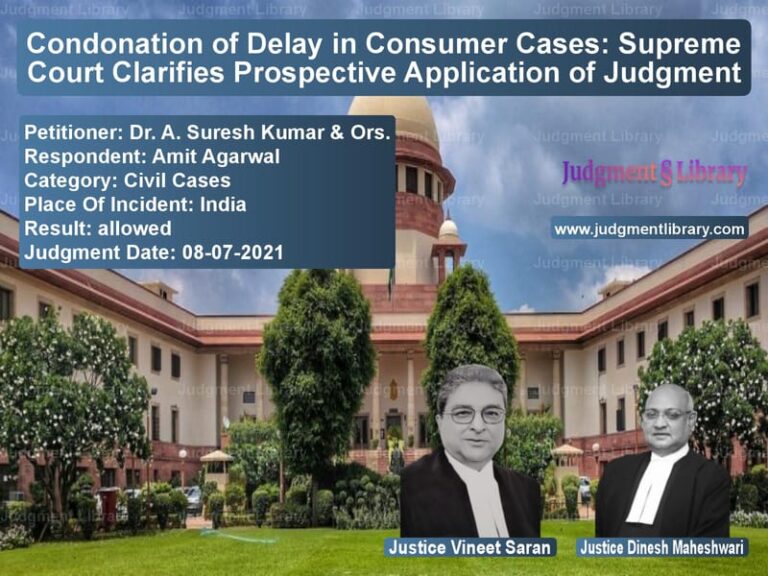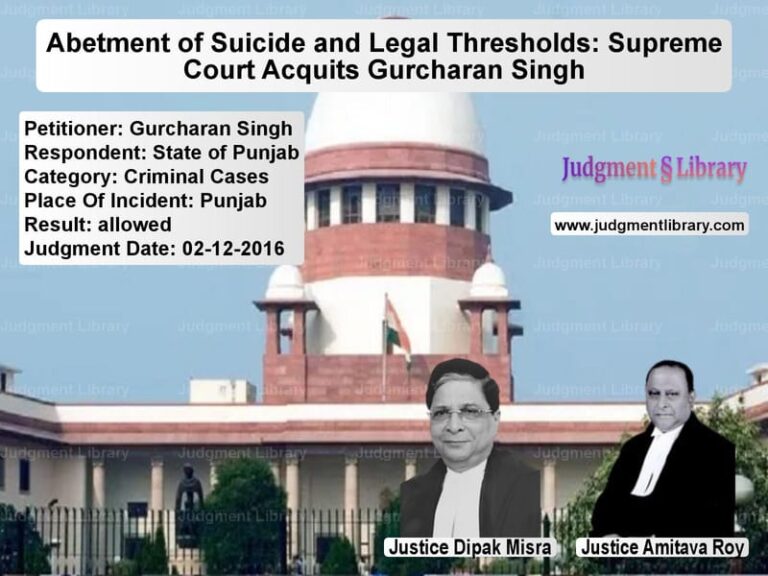Landlord’s Right to Interest on Rent Arrears: Supreme Court Enforces Tenancy Law
The case of Bhagirath Agarwal vs. M/S Simplex Concrete & Piles (I) Pvt. Ltd. is a landmark decision by the Supreme Court of India that clarifies the legal entitlement of landlords to interest on arrears of rent under the West Bengal Premises Tenancy Act, 1956. This judgment ensures that tenants cannot escape their statutory obligation to pay interest on overdue rent when permitted to clear arrears in installments.
Background of the Case
The dispute arose between the appellant, Bhagirath Agarwal (landlord), and the respondent, M/S Simplex Concrete & Piles (I) Pvt. Ltd. (tenant), over unpaid rent. The tenant defaulted in paying rent from November 1990 onwards, accumulating substantial dues over a period of 186 months (November 1990 to April 2006). The City Civil Court at Calcutta permitted the tenant to clear outstanding dues in installments but denied the landlord interest on arrears.
Key Issues in the Case
- Whether a landlord is entitled to interest on rent arrears when the court permits the tenant to pay in installments.
- Whether courts have the discretion to deny interest despite statutory provisions mandating its payment.
- The interpretation of Section 17(2A) of the West Bengal Premises Tenancy Act, 1956, which governs the payment of arrears and interest.
Trial Court’s Findings
The City Civil Court at Calcutta ruled that the tenant had defaulted in paying rent at the rate of Rs. 19,000 per month since November 1990, leading to a total outstanding amount of Rs. 35,34,000. The court:
- Ordered the tenant to pay arrears in ten monthly installments of Rs. 3,00,000 each, with the last installment being Rs. 2,34,000.
- Directed that the first installment be paid by June 30, 2006.
- Refused to award any interest on the outstanding rent.
The landlord, aggrieved by the denial of interest, appealed to the High Court.
High Court’s Decision
The Calcutta High Court upheld the City Civil Court’s order, affirming that the decision to deny interest was within the court’s discretion.
Arguments by the Petitioner (Landlord)
The appellant, Bhagirath Agarwal, argued that:
- The West Bengal Premises Tenancy Act, 1956, explicitly states that interest must be paid when rent arrears are cleared in installments.
- By refusing to award interest, the lower courts violated a statutory mandate and created financial hardship for landlords.
- The tenant benefited from an extended payment timeline, which justified awarding interest.
- Courts do not have discretion in matters where statutory provisions clearly dictate specific legal entitlements.
Arguments by the Respondent (Tenant)
The tenant countered that:
- The arrears accumulated due to disputes over amenities provided by the landlord.
- The City Civil Court considered the tenant’s circumstances and found it fair to waive interest.
- The lower courts had discretion under the West Bengal Premises Tenancy Act, 1956.
Supreme Court’s Observations
The Supreme Court reviewed the provisions of the West Bengal Premises Tenancy Act, particularly Section 17(2A), which states:
“Whenever payment of rent including arrears is permitted to be paid in installments, the Statute contemplates that the beneficiary shall be granted interest.”
The Court clarified that:
- Interest on arrears is a statutory right of the landlord, not a discretionary relief.
- Courts do not have the authority to override explicit statutory mandates.
- By waiving interest, the lower courts violated the principles of statutory interpretation.
Final Judgment
On March 23, 2017, the Supreme Court ruled:
- The appeal was allowed.
- The landlord was entitled to interest on arrears of rent.
- The decisions of the High Court and City Civil Court were set aside.
- No costs were imposed.
Legal Implications of the Judgment
The ruling reinforces several legal principles:
- Statutory Interpretation: Courts must apply tenancy laws as written, without judicial discretion.
- Landlord’s Rights: Protects landlords from financial loss due to rent defaults.
- Tenancy Law Clarity: Ensures consistency in rent arrears cases under the West Bengal Premises Tenancy Act.
Conclusion
The Supreme Court’s decision upholds the integrity of statutory tenancy laws, ensuring landlords receive fair compensation for rent arrears. By reinforcing the principle that legal mandates cannot be overridden by judicial discretion, the ruling provides essential legal clarity for tenancy disputes in India.
Don’t miss out on the full details! Download the complete judgment in PDF format below and gain valuable insights instantly!
Download Judgment: Bhagirath Agarwal vs MS Simplex Concrete Supreme Court of India Judgment Dated 23-03-2017.pdf
Direct Downlaod Judgment: Direct downlaod this Judgment
See all petitions in Property Disputes
See all petitions in Lease Agreements
See all petitions in Damages and Compensation
See all petitions in Judgment by Kurian Joseph
See all petitions in Judgment by R. Banumathi
See all petitions in allowed
See all petitions in supreme court of India judgments March 2017
See all petitions in 2017 judgments
See all posts in Civil Cases Category
See all allowed petitions in Civil Cases Category
See all Dismissed petitions in Civil Cases Category
See all partially allowed petitions in Civil Cases Category







